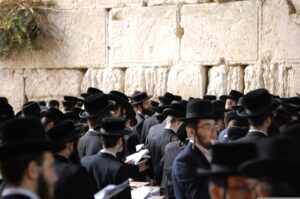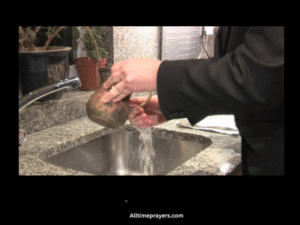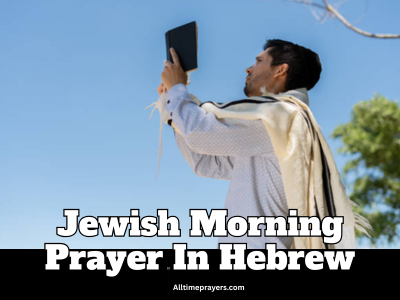Jewish Morning Prayer In Hebrew is here for people who wish to join and learn how to pray jewish morning prayer in Hebrew, this Jewish morning prayers can bring God’s present to guide and direct your day. Learn this basic simple jewish morning prayers in Hebrew to help you connect with God at your convenient manner.
Jewish prayer life is one of the most profound and disciplined aspects of faith. Every morning, before stepping into the demands of life, observant Jews begin their day with a series of prayers collectively called Shacharit.
These prayers are recited in Hebrew, the sacred language of the Torah, which adds a deep sense of holiness and continuity with Jewish ancestors throughout history. Praying in Hebrew allows worshippers to experience the rhythm, poetry, and divine mystery of God’s Word in its original form.
Each prayer connects the body, soul, and spirit with the Creator, filling the heart with gratitude, reverence, and strength for the day ahead. In this jewish morning prayer in Hebrew, we will explore the structure, Hebrew text, transliteration, translation, commentary, testimonies, and spiritual impact of the Jewish morning prayers.
Why Jewish Morning Prayer Is Important
Morning prayers serve as the first conversation of the day between the soul and God. The Talmud (Berachot 26b) teaches that prayer was established by the patriarchs, and Abraham instituted the morning prayer. Thus, praying at dawn not only honors tradition but also embodies the essence of Jewish faith: devotion, gratitude, and dependence on God.
Key Benefits of Morning Prayer:
- Gratitude: Starting the day with thanks cultivates humility and joy.
- Focus: Prayer aligns the heart before work, family, or challenges.
- Continuity: Hebrew prayers connect Jews worldwide in shared worship.
- Strength: Blessings remind us of God’s constant protection.
Structure of Jewish Morning Prayer (Shacharit)

Morning prayer has a traditional structure preserved in the Siddur (Jewish prayer book):
- Modeh Ani – First words upon waking.
- Netilat Yadayim – Ritual washing of hands.
- Birkot HaShachar – Morning blessings of gratitude.
- Pesukei D’Zimra – Verses of praise from Psalms.
- Shema and its blessings – Central declaration of faith.
- Amidah – The standing prayer of petition and thanksgiving.
- Concluding prayers – Aleinu, Kaddish, and psalms.
Modeh Ani – Gratitude Upon Waking
Hebrew Text
מוֹדֶה אֲנִי לְפָנֶיךָ מֶלֶךְ חַי וְקַיָּם, שֶׁהֶחֱזַרְתָּ בִּי נִשְׁמָתִי בְּחֶמְלָה, רַבָּה אֱמוּנָתֶךָ.
Transliteration
Modeh ani lefanecha, Melech chai v’kayam, shehechezarta bi nishmati b’chemlah, rabbah emunatecha.
Translation
“I give thanks before You, living and eternal King, for You have returned my soul within me with compassion; great is Your faithfulness.”
Commentary
- Modeh Ani is recited even before washing hands, since it does not mention God’s name.
- It teaches that life itself is a miracle and each morning is a resurrection of the soul.
- This simple prayer sets the tone for gratitude.
Netilat Yadayim – Washing of Hands

Upon waking, Jews wash their hands using a special ritual vessel. This practice is both symbolic and spiritual.
Blessing in Hebrew:
בָּרוּךְ אַתָּה ה׳ אֱלֹהֵינוּ מֶלֶךְ הָעוֹלָם אֲשֶׁר קִדְּשָׁנוּ בְּמִצְוֹתָיו וְצִוָּנוּ עַל נְטִילַת יָדַיִם.
Translation:
“Blessed are You, Lord our God, King of the universe, who sanctified us with His commandments and commanded us regarding the washing of hands.”
This act symbolizes spiritual purification before prayer.
Birkot HaShachar – Morning Blessings
These blessings thank God for daily functions we often take for granted.
Examples:
- Vision Restored
Hebrew: בָּרוּךְ אַתָּה ה׳… פּוֹקֵחַ עִוְרִים
“Blessed are You… who gives sight to the blind.” - Freedom
Hebrew: בָּרוּךְ אַתָּה ה׳… מַתִּיר אֲסוּרִים
“…who frees the bound.” - Strength
Hebrew: בָּרוּךְ אַתָּה ה׳… זוקֵף כְּפוּפִים
“…who straightens the bent.”
Commentary
Each blessing acknowledges life’s simplest functions—seeing, standing, dressing—as divine gifts.
Pesukei D’Zimra – Verses of Praise
This section consists of Psalms and praises that uplift the soul.
Example: Psalm 145 (Ashrei):
פּוֹתֵחַ אֶת יָדֶךָ וּמַשְׂבִּיעַ לְכָל חַי רָצוֹן
“You open Your hand and satisfy the desire of every living thing.”
This portion prepares the heart for Shema and Amidah.
The Shema – Core of Jewish Faith
The Shema is central in morning prayer.
Hebrew Text
שְׁמַע יִשְׂרָאֵל, ה׳ אֱלֹהֵינוּ, ה׳ אֶחָד.
Translation
“Hear, O Israel: The Lord is our God, the Lord is One.”
Reflection
- Declares God’s unity.
- Calls for full love and devotion (Deuteronomy 6:5).
- A daily reminder of identity and covenant.
The Amidah – Standing Prayer
The Amidah includes 19 blessings, divided into three categories:
- Praise (Avot, Gevurot, Kedusha).
- Petition (requests for wisdom, healing, sustenance).
- Thanksgiving (gratitude for God’s goodness).
Excerpt in Hebrew:
בָּרוּךְ אַתָּה ה׳ מְחַיֵּה הַמֵּתִים.
“Blessed are You, Lord, who revives the dead.”
Concluding Prayers
- Aleinu praises God’s sovereignty.
- Kaddish sanctifies God’s name.
- Psalms conclude with joy and reverence.
Testimonies
Rachel’s Story – Gratitude in Stress
Rachel, a teacher in New York, said that starting her mornings with Modeh Ani helped her focus on gratitude during overwhelming school days.
David’s Story – Strength in Loss
David, in Jerusalem, found comfort in the Amidah after losing his father. The Hebrew words gave him peace when his own words failed.
Leah’s Story – Passing Faith to Children
Leah from Toronto taught her children the Birkot HaShachar, helping them see everyday functions—like walking and eating, as blessings.
Practical Tips for Beginners
- Start Small: Begin with Modeh Ani and Birkot HaShachar.
- Use Transliteration: It helps beginners pray in Hebrew without fluency.
- Pray Consistently: Build habit and discipline.
- Join Community: Synagogue prayers enrich the experience.
- Meditate on Meaning: Don’t just recite—understand.
Historical Roots of Morning Prayer
- Biblical Origins: Abraham prayed in the morning (Genesis 19:27).
- Temple Tradition: Shacharit corresponds to the morning Tamid (daily sacrifice).
- Rabbinic Development: Rabbis structured the Siddur for all generations.
Testimonies: The Transformative Power of Morning Prayer
1. Rachel’s Testimony – Finding Peace in the Classroom
Rachel, a Jewish schoolteacher from New York, often woke up feeling overwhelmed with responsibilities. Between grading assignments, managing classrooms, and caring for her family, she felt drained before her day even began. A friend encouraged her to start each morning with Modeh Ani and Birkot HaShachar.
Rachel explained:
“When I began reciting Modeh Ani in Hebrew, it shifted my perspective. I realized that if God had returned my soul in the morning, then my day had purpose. The morning blessings reminded me that even the ability to see, stand, or dress myself was a miracle. It gave me peace and helped me walk into my classroom with renewed energy.”
Today, Rachel teaches her students short Hebrew morning blessings as part of their routine. She says it has created a calmer, more thankful environment in her classroom.
2. David’s Testimony – Strength in Mourning
David, a businessman living in Jerusalem, lost his father suddenly. The grief was heavy, and words felt empty. During this time, he turned to the Amidah in Hebrew.
“The Hebrew words carried me when my heart was too broken to speak. Praying the Amidah connected me to generations before me, who also prayed these same words through joy and sorrow. I felt that I wasn’t alone. The phrase ‘Blessed are You, Lord, who revives the dead’ touched me deeply. It gave me faith that God was still with me and that my father’s soul was in His care.”
David continues to pray the morning Amidah daily, finding it a source of strength and resilience.
3. Leah’s Testimony – Passing Faith to Children
Leah, a mother of three in Toronto, wanted to raise her children with strong Jewish values. She introduced them to the Birkot HaShachar, teaching them simple blessings to thank God each morning.
“At first, it was just a few words in Hebrew with translations. But soon, my kids began to ask about the meaning behind the prayers. They realized that waking up healthy, being able to see, and having food were all blessings from God. It changed how they approached their mornings. Now they remind me to pray if I forget!”
Leah says this practice has strengthened her family’s bond and created a home filled with gratitude.
4. Michael’s Testimony – Discipline and Focus
Michael, a college student in London, struggled with focus and time management. He often felt rushed in the mornings and lacked spiritual grounding. A rabbi encouraged him to commit to a short Hebrew prayer each morning.
“At first, it felt hard to set aside time. But I started with Modeh Ani, which takes less than a minute. That small step gave me discipline. Soon, I added Shema and parts of the Amidah. It became my anchor. I found that I approached exams, challenges, and even friendships with greater clarity and patience.”
Michael credits morning prayer with helping him succeed academically and spiritually.
5. Miriam’s Testimony – Healing Through Gratitude
Miriam, a grandmother in Chicago, was recovering from surgery and felt physically weak. She began to recite the Hebrew morning blessings that thank God for daily abilities like standing up, walking, and clothing the naked.
“When I prayed, ‘Blessed are You… who straightens the bent,’ it felt personal. I was bent and weak, yet God was giving me strength day by day. Each blessing became more than words; it was my lived reality. The prayers helped me heal not only physically but emotionally. They reminded me that God’s compassion renews every morning.”
Miriam now shares her testimony in her synagogue, encouraging others to lean on prayer during recovery or illness.
6. Samuel’s Testimony – Rediscovering Identity
Samuel, a young professional who had drifted away from his Jewish roots, rediscovered his faith when he attended morning services in Hebrew during a trip to Israel.
“I didn’t understand all the Hebrew, but standing with others, reciting the Shema, and hearing the Amidah moved me. It was like reconnecting with a part of myself I had forgotten. When I returned home, I bought a Siddur with transliteration and started praying each morning. It gave me identity, belonging, and spiritual direction I had been searching for.”
Similar Job opportunity
- Family Morning Prayer
- Morning Prayers and Devotions with Scriptures
- Morning Prayers for the Day
- Chabad.org – Shacharit Guide
- My Jewish Learning – Morning Prayers
Conclusion
The Jewish morning prayer in Hebrew is a rich, structured way to begin the day. From Modeh Ani at dawn to the Amidah and concluding Psalms, every prayer draws the soul closer to God. These prayers cultivate gratitude, humility, and strength, reminding us that every breath, step, and opportunity is a divine gift.
By reciting them daily, Jews not only honor tradition but also elevate their mornings into moments of holiness and joy.






